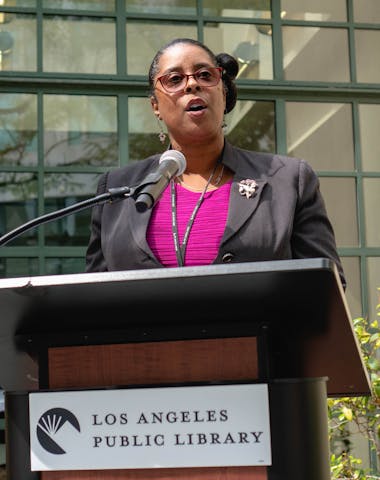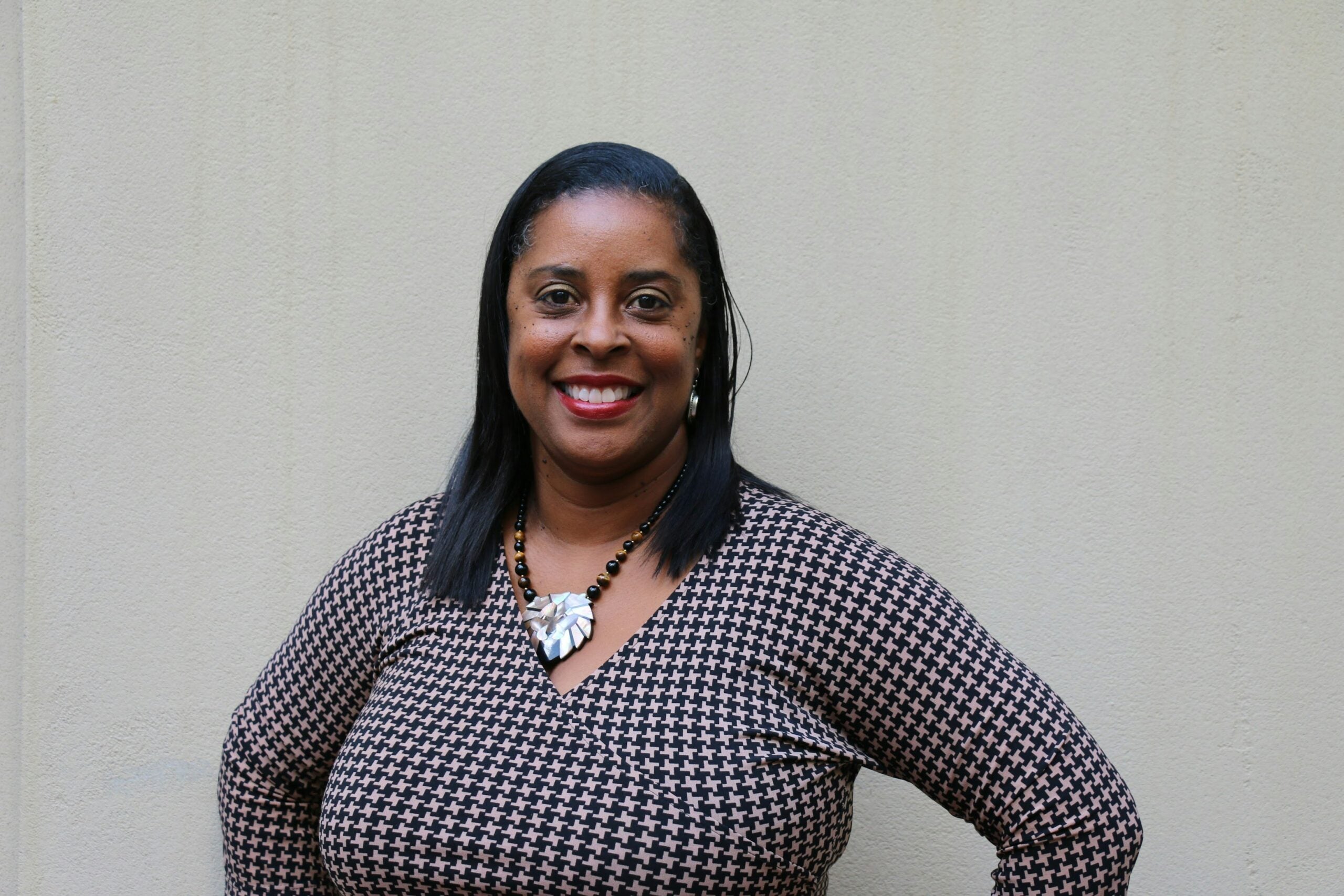UCLA Information Studies alumna draws upon 24 years of library management experience at Los Angeles Public Library.
Jené D. Brown (’97, MLIS) recalls a fond memory of meeting the late Congressman John Lewis at the annual National Conference for African American Librarians in 2013. After learning that Brown worked for the Los Angeles Public Library (LAPL), Congressman Lewis shared that his wife, Lillian Lewis, had also worked at LAPL as a librarian before he whisked her off to get married and move to Atlanta, Georgia.
This short but meaningful exchange is something Brown continues to hold close to her heart, and Congressman Lewis among other thought leaders, including E.J Josey, Stacey Abrams, and Jason Reynolds, have influenced Brown to be a change agent in her roles at the LAPL and as California Library Association’s (CLA) president-elect.
“I admire their confidence and conviction; intelligence and insightfulness. I share their willingness to speak the truth and take action, especially to right the wrongs,” says Brown.

Brown is passionate about innovative public service that informs, enriches and empowers diverse communities. She has been working with the LAPL since graduating from UCLA’s Master’s in Library and Information Science (MLIS) program in 1997 with a concentration on Information Policy and Management. Brown began her career as a children’s librarian and now has over 24 years of library management experience.
“It’s such a large system that I’ve been able to serve Angelenos in various capacities from children’s librarian to moving through branch management, then to management over an entire department and now management of a division,” she notes.
Brown was recently promoted as the director of Emerging Technologies and Collections (ETC) Division for the Los Angeles Public Library, which supports the citywide materials collections, digital services, and staff development.
“The ETC Division – Acquistions, Cataloging, CARL Support Office, Digital Content Team, Emerging Technology projects, Multilingual Collections, and Training – is the cornerstone of how we deliver public services,” says Brown.
Brown also holds association memberships with the American Library Association (ALA), Black Caucus American Library Association (BCALA), California Library Association (CLA), the California Librarians Black Caucus (CLBC), the Los Angeles Association of Black Personnel, Inc. and UCLA’s Library and Information Studies Alumni Association (LISAA). Serving on the Coretta Scott King Book Awards Executive Board (2017-2019) was a career highlight. Brown will begin her term as CLA President on November 15, 2021.
In a recent conversation with The Latest, Brown shared her vision for CLA, initiatives she is working on at LAPL to ensure equal opportunities and access for all, and the hallmark advantages of a MLIS degree from UCLA.
What compelled you to run for CLA President?
Jené D. Brown: 2020 has been full of unexpected situations, challenges and tremendous social injustices coming to light. While I cannot deconstruct centuries of injustice and mistreatment of Black, Indigenous and People of Color, I can do my part. I must stop complaining and put myself in a position to have a real impact and to make a difference. Instead of just wishing for change, I can be an influencer, an example, an agent for change who leads the California Library Association forward. This is achieved by applying a racial equity and inclusion lens, in other words, keeping in mind who benefits and who is burdened by our library policies, decision-making, programs and services. Let the healing begin with me.
The time is now to step up and make my mark. Instead of expecting someone else to impart change, it’s my responsibility to be the change I wish to see. I am excited to lead the California Library Association in the next phase of its evolution. It’s time for me to blaze a trail and leave a legacy. Lastly, I’d like to continue the CLA tradition of extraordinary leadership.
How has the pandemic made digital access that much more important?
Brown: The pandemic just heightened existing racial equity and equality issues when it comes to digital access. Shutting down the libraries really affected community members who relied on the resources offered by the library. They could no longer come or even sit outside of our libraries for internet connection.
I oversee our Emerging Technology projects team, which works on initiatives surrounding digital inclusion among other projects. One of our areas of focus is on increasing digital access through our hotspot loan program that provides internet access to families and households that lack these services. We will expand our program to also loan devices along with hotspots on a long term basis.
What do you feel are most critical challenges and opportunities facing California libraries right now?
Beyond digital access, the other big issue in libraries is surrounding equity, diversity, and inclusion. The folks who work in our libraries don’t particularly reflect the communities they serve. We want folks to be able to see people who look like them when they go into their local branches or even college and university libraries as well. The library profession as a whole needs to be doing more to recruit diverse librarians or people from different backgrounds and supporting them to succeed and promote in the system.
Libraries need to communicate with our young people as they are the future. We must do a better job of informing them of the roles they can play in our institutions. Students from diverse backgrounds must be introduced to our profession. We must listen to their ideas and solicit feedback on the services, resources, and programs we provide.
Three years ago, I launched the LAPL’s Diversity and Inclusion Apprenticeship (DAIA) Program, based on the Public Library Association’s Inclusive Internship Initiative (III). It is a 12-week mentored summer program that introduces high school students to varying aspects of the library and provides them with a paid internship to gain awareness and work experience in a public library. Students learn about library leadership, library management, programming, collection and development. The program also requires the students to complete a capstone project, which addresses a particular community issue. DAIA introduces students to career opportunities in public libraries at a critical point in their educational careers. Replicating this type of mentorship program is a step in a favorable direction to diversifying the profession.
What has been your experience serving on the UCLA Library and Information Studies Alumni Association Board?
Brown: I feel this sense of duty to give back, especially to institutions that have given me so much. It’s a way for me to strengthen the educational institution that I have been a part of, and I want to pay it forward to the current library school students by supporting them and their educational pathways. I just enjoy being on the board with so many alumni who share that same passion of giving back and keeping the institution alive, viable and vibrant.
How did your education at UCLA Department of Information Studies prepare you for a career in librarianship?
Brown: Graduating from UCLA’s MLIS program changed my life. I had the opportunity to work as an intern at different libraries including LAPL, UCLA Biomedical Library, and a law library in downtown Los Angeles. Those internships really helped shape and solidify my goal of becoming a librarian. The internship experiences gave me the necessary work experience and access to potential employers, who gave me great advice and insight in navigating the field.
I have always been interested in working with children, and for my internship at LAPL I had the opportunity to assist a children’s librarian with story time. From that moment, I was convinced of my desire to be a youth librarian. This is what I want to do, and I can visualize myself as a budding rookie librarian in a public library. I applied for a full-time role as a librarian at LAPL a couple of months before graduation and was offered the job. I don’t know if I would have been associated with LAPL for 25 years if I had not had an internship experience and built the relationships I have with the librarians there.
Hands down, I had the greatest graduate advisor in Virginia Walter, whose area of focus was in children’s literature and youth services. Everyone in the program was supportive and really wanted me and my classmates to succeed in the MLIS program. The solid graduate school curriculum coupled with the practical experience of the internships prepared me well to ascend at LAPL. I appreciated having the opportunities to apply theory to real-world, professional settings.
What are you looking forward to in your upcoming term as CLA president?
Brown: I’m looking forward to leading the Planning Team for the annual CLA conference. The conference will be in-person at the Sacramento Convention Center from June 2-4, 2022. We’ve already selected a theme: Together Towards Tomorrow, We Strengthen Library Communities. I’d love to see conference attendees identify and bring a “conference buddy.”
I’m looking forward to leading this conference and contributing to the continuing education of library workers. It’s important to be involved with library associations to stay current and abreast of relevant trends. It’s also a great networking opportunity to exchange and share ideas with colleagues.
Additionally, the recruitment and retention of CLA members is at the top of my list. My aim is to increase the number of CLA members who work in academic, school, special, and archival institutions.
What advice would you give to prospective students interested in pursuing an MLIS?
Brown: I encourage prospective students to get involved in library associations as library schools students to expand their professional networks. The library world is small and it’s advantageous to start building networks with future colleagues as a student.
I think librarianship is the coolest gig ever because there is something for everyone no matter who you want to serve. If you are interested in serving college students, you can work at an academic library. If you want to be more specialized and help those who are incarcerated, you can work at a prison library. You can have an impact in any capacity if you really want to make a difference and help improve lives for people in our communities.
Libraries are pillars of the community. We have garnered the public’s trust, and consequently, we must honor that trust by being gatekeepers of communities, information, heritage, history and more.
Every day I’m learning something new, whether it’s from colleagues or from the public or d the constituents I’m serving. So, the other piece of advice I’d give students is to keep growing, learning and sharing. Be willing and able to expand your awareness. Strive to meet the informational, recreational and educational needs of the people you serve. Be a contributor to a more informed and literate society.
Thank you so much for this opportunity to share.
